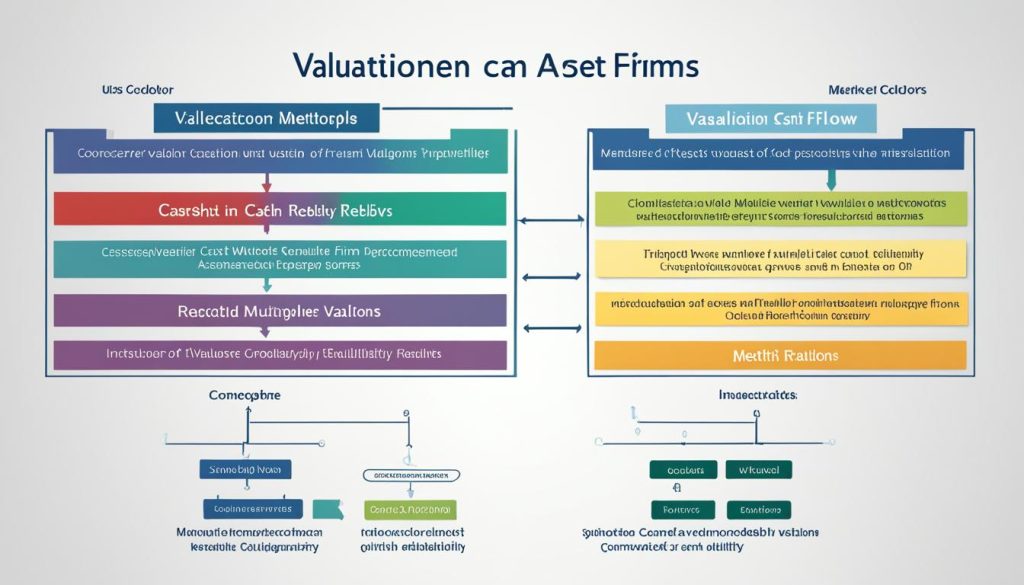Valuing a wealth management firm is a critical step in various business scenarios. From determining the sale value to establishing partner ownership, taxation, and even divorce proceedings, understanding the valuation process is essential. By assessing the economic value of a business or business unit, you can make informed decisions and navigate the financial landscape with confidence.
Business valuation relies on various methods to capture the true worth of a wealth management firm. These methods include market capitalization, times revenue, earnings multiplier, discounted cash flow, book value, and liquidation value. Each method is designed to provide unique insights into the financial health and potential of the firm.
In this article, we will delve into the intricacies of business valuation for wealth management firms. From the basics of valuation to understanding its significance in selling a business, we will explore key concepts and best practices to help you navigate the numbers effectively.
Key Takeaways:
- Valuing a wealth management firm is crucial for various business scenarios.
- Business valuation methods include market capitalization, times revenue, earnings multiplier, discounted cash flow, book value, and liquidation value.
- Understanding business valuation is essential to make informed decisions about selling a wealth management firm.
- Engaging professionals and following best practices enhances the accuracy and credibility of the valuation process.
- By navigating the numbers effectively, you can achieve a successful valuation and make strategic decisions for your wealth management firm.
The Basics of Business Valuation
Business valuation is a crucial process that determines the economic value of a business. It plays a key role in determining the fair value of a business for various purposes, including sale value, partner ownership, taxation, and divorce proceedings.
Professional business evaluators are often consulted to provide an objective estimate of a business’s value. Their expertise and knowledge help ensure an accurate valuation that takes into account all relevant factors.
There are several methods used to value a business, each providing a different perspective on its worth. These methods include market capitalization, times revenue method, earnings multiplier, discounted cash flow method, book value, and liquidation value. The choice of valuation method depends on various factors, such as the industry, financial performance, and future projections.
Valuing a business is not a one-size-fits-all approach. It requires a thorough understanding of the business’s financials, industry trends, and market conditions. With the help of professional business evaluators, businesses can gain valuable insights into their economic value and make informed decisions based on fair valuation.
Understanding the basics of business valuation is essential for any business owner or stakeholder. By gaining insights into the economic value of a business, they can make informed decisions regarding its future, whether it involves selling the business, determining partner ownership, or planning for taxation and legal purposes.
Next, we will explore how business valuation plays a crucial role when selling a business and how it can impact negotiations and strategic planning.
Understanding Business Valuation in Selling a Business
When it comes to selling a business, understanding the process of business valuation is absolutely essential. Business valuation plays a crucial role in determining the fair selling price of the business. By considering various factors such as financial data, industry projections, assets, and liabilities, a comprehensive business valuation provides credibility during negotiations with potential buyers and allows for strategic planning to enhance the value of the business before selling.
During the selling process, having a solid understanding of business valuation provides you with the confidence and clarity you need to make informed decisions. It enables you to accurately assess the worth of your business and set a realistic selling price that aligns with the market trends.
“Business valuation is not just about numbers; it’s about strategically positioning your business in the market and leveraging its strengths to achieve the best selling price.” – John Smith, Business Broker
By working with professionals who specialize in business valuation, you can gain valuable insights and guidance throughout the selling journey. These experts bring their expertise and knowledge to the table, ensuring that your business is accurately evaluated and positioned to attract potential buyers.
Strategic planning plays a vital role in maximizing the value of your business before selling. A comprehensive business valuation report provides you with detailed insights into the strengths and weaknesses of your business, allowing you to focus on enhancing its value in specific areas. Implementing strategic initiatives based on the valuation results can help you showcase the potential growth and profitability of your business, making it even more attractive to potential buyers.
Having a deep understanding of business valuation empowers you to effectively navigate negotiations with potential buyers. Armed with a comprehensive valuation report, you can substantiate your desired selling price and confidently address any concerns or objections raised during the negotiation process. This increases your chances of reaching a favorable agreement that aligns with your expectations and overall financial goals.
To summarize, business valuation is a critical component of selling a business. It helps you determine the fair selling price, provides credibility during negotiations, allows for strategic planning to enhance business value, and empowers you to make informed decisions throughout the selling process. By investing in a comprehensive business valuation and leveraging professional expertise, you can optimize your chances of achieving a successful and profitable sale.
Best Practices for Business Valuation
Valuing a business involves a combination of art and science. To ensure accurate and reliable results, it is essential to follow best practices in the valuation process. Here are some key considerations:
Choose the Right Valuation Method
Various valuation methods exist, including market capitalization, times revenue method, earnings multiplier, discounted cash flow method, book value, and liquidation value. It is important to select the method that aligns with the unique characteristics and circumstances of the business. A thorough understanding of the business and its industry is crucial in making this decision.
Engage Professionals
Business valuation is a complex task that requires expertise and objectivity. Engaging professionals, such as Certified Exit Planning Advisors or experienced appraisers, can add precision and authority to the valuation process. Their vast knowledge and experience help ensure accurate valuation results and enhance the credibility of the valuation.
Engaging professionals in the business valuation process brings a fresh perspective and reduces the risk of bias. Their expertise helps mitigate potential errors and ensures compliance with industry standards.
Maintain Comprehensive Financial Records
Accurate financial records are the backbone of any business valuation. Keeping detailed and up-to-date records of financial statements, tax returns, balance sheets, income statements, and cash flow projections is crucial. It allows valuers to assess the financial health of the business and accurately determine its value.

Consider Market Trends and Economic Environment
Business valuation cannot exist in isolation. It is important to consider market trends, industry dynamics, and the overall economic environment when determining the value of a business. Understanding the current market conditions and future projections provides valuable context and helps make data-driven decisions.
Use Valuation Results for Strategic Planning
The outcomes of a business valuation should serve as a foundation for strategic planning. Analyzing the valuation results can help identify areas for improvement and growth opportunities. It allows businesses to develop targeted strategies that enhance their value and financial performance.
By adhering to these best practices, businesses can ensure a reliable and accurate business valuation process. Valuation methods tailored to the business, engagement of professionals, comprehensive financial records, consideration of market trends, and strategic planning based on valuation results will help maximize the value of the business.
Conclusion
Valuing a wealth management firm is a complex process that requires careful analysis and consideration of various factors. The business valuation techniques, such as market capitalization, times revenue method, earnings multiplier, discounted cash flow method, book value, and liquidation value, provide different perspectives on the worth of the firm.
Understanding the valuation process is crucial for accurate assessment and strategic decision-making in the context of selling a wealth management firm. By following best practices and engaging professionals, businesses can navigate the numbers and achieve a successful valuation.
Whether it’s determining the sale value, establishing partner ownership, or accounting for tax purposes, having a comprehensive understanding of business valuation techniques is vital for wealth management firms from all angles. It enables informed decision-making, enhances negotiation power during sales, and allows for effective strategic planning. By working with seasoned experts and leveraging the right valuation methods, wealth management firms can confidently navigate their valuation journey and make the most of their assets.

No comments! Be the first commenter?